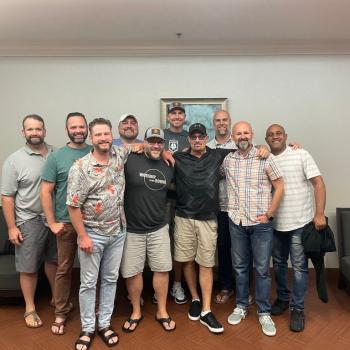Michael Frost has just released a new book called Incarnate: The Body of Christ in the Age of Disengagement. I caught up with Frost recently to talk about his book. Enjoy!

Instead of asking, “what is your book about,” I’m going to ask the question that’s behind that question. And that unspoken question is, “how are readers going to benefit from reading your book?”
Michael Frost: I hope my book will benefit readers by revealing to them the extraordinarily powerful cultural forces that propel them toward living in a disembodied, disengaged, and displaced way. We are being shaped by a culture that leaves us disconnected from our bodies, alienated from each other and less ‘placed’ in the world around us.
And I think these forces are having an unconscious effect on us. We just don’t realize how powerful they are. And what’s more, this culture is leading us in the exact opposite direction to the life that Jesus calls us to – which is an embodied, present, placed way of life. So I hope my readers benefit from my diagnosis of the problem of disengagement as well as my prognosis, which is to follow the incarnational way of Christ.
Tell us a bit about the experiences that shaped the insights in the book.
Michael Frost: Well, I’ve observed that many church leaders are open to participating in the missional conversation. The church is waking up to the fact that we are a sent people. But my fear has been that while we ‘get’ sentness, we don’t fully understand the incarnational piece.
If mission has an outward thrust, then the incarnational has a downward thrust. Yes, we are sent out, but we are also sent down, deeper into relationship, into the neighborhood, into an embodied, engaged, fully present posture in society. I was motivated to write this book by my anxiety that the church isn’t fully getting the whole missional thing until they understand incarnational living.
How is your book different from other books on discipleship, mission, and incarnation?
Michael Frost: There are a lot of awesome books out there on those topics, but I think the unique contribution Incarnate makes is in its cultural analysis. It’s not enough to call your congregation to go and live in an incarnational way unless you understand the relentless excarnational forces in society.
Excarnation is the opposite of incarnation. If incarnation means to put on flesh, then excarnation refers to removing flesh, and I think our current secular society has a powerful “defleshing” effect on us. It pushes us to live a hyper-individualistic, disconnected, cyber-based, rootless existence. Unless you understand these forces it’s very difficult to formulate a Christian response to them. If churches are serious about being missional-incarnational communities of faith, then they need to know what they’re up against.
But having described those cultural forces, I then seek to unpack a biblical, Christike response to genuine embodiment, godly engagement and deep rootedness. It’s only by living in this way –as Christ did – that we have any hope of really impacting our secular society.
Give us two or three insights from the book that would be helpful to Christians.
Michael Frost: Zygmunt Bauman said the perfect metaphor for contemporary society is the airport gate lounge. Think about that. The gate lounge is a soulless place. It’s a liminal place where people are merely passing through, where no one belongs, where everyone is glued to a screen, waiting to leave. Everyone is anxious in a gate lounge, checking the flight information, looking at their watches, wanting to move on.
If you want to understand our excarnate secular age watch the George Clooney film, Up in the Air. It perfectly describes the rootless, soulless, disembodied world we live in. In my book I say that the church should be the alternative to that. We should be modeling what belonging, community, rootedness, and peace truly look like.
Secondly, I think we need take a good look at the way we conduct ourselves as Christians to see whether we’ve been shaped by excarnational forces in society. For example, has our worship life becoming disembodied? Do I only ever encounter God “in my head” or should worship also be a communal and bodily experience? Have I allowed my involvement in mission to be focused too much on disembodied responses such as online advocacy?
There’s nothing wrong with advocacy or online petitions or the like, but they are not enfleshed responses to poverty or unbelief, are they? We need to continue to ask ourselves whether our involvement in mission, formation, worship and community have lost physical, embodied, present and placed expression.
Who is the main audience that you’re trying to target with this book?
Michael Frost: Essentially it’s for anyone who wants to understand how our society is reshaping the human understanding of our bodies, relationships and sense of community. But it will be particularly helpful for church leaders trying to form biblical missional disciples.
What do you hope readers will walk away with after they finish your book?
Michael Frost: The strength, courage and insight to be at one with God in their bodies, to find meaning in community, to love their neighbors, to kindle the new way of being human as revealed to us in Jesus’ example and teaching. In short, to be a truly incarnational follower of the Incarnate One.














